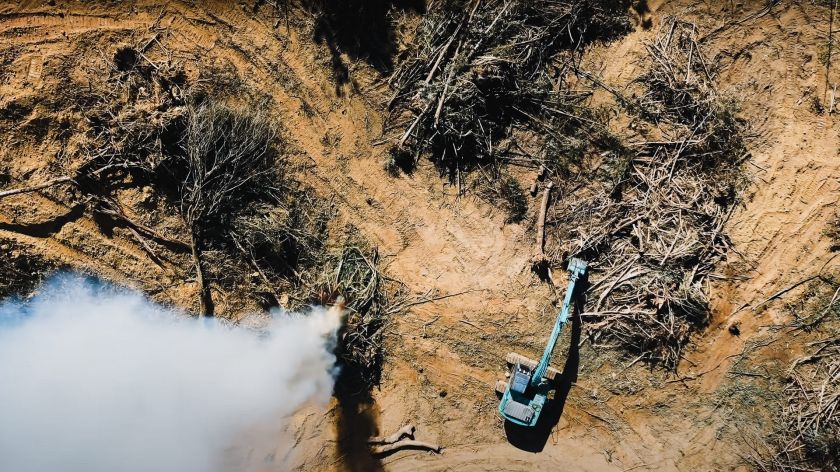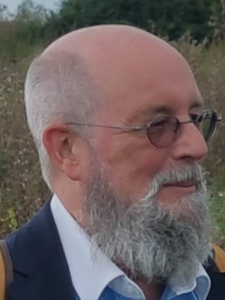Scientists on the new Radboud campaign: ‘Not everyone is responsible for climate change.’
-
 Still uit de campagnevideo
Still uit de campagnevideo
According to Radboud University’s new campaign film, mankind is a threatened species. Several scientists question that message. 'This video is particularly unscientific.'
Drastic measures are needed worldwide to secure the future of life on this planet, according to the latest report from the IPCC (Intergovernmental Panel on Climate Change). Radboud University supports this message, as stated by President Daniël Wigboldus last Monday at the New Year’s gathering.
Following that, during the same event, the university’s new campaign film was presented, which will be aired on TV and the internet in the coming weeks. The central message of the film is that mankind is also a threatened species. But is that really the case?
Uninhabitable areas
Due to climate change, loss of biodiversity, and other environmental problems, significant challenges are indeed looming, says Environmental Science Professor Heleen de Conink. ‘These can amplify existing social problems. This is evident from science, including the IPCC as well as IPBES, the biodiversity counterpart to IPCC.’

The consequences of climate change, according to the climate scientist, will be significant. ‘Areas will become uninhabitable over time, poverty will increase due to more and more severe extreme weather, and many deaths will occur,’ she says. ‘But the extinction of mankind is not, to my knowledge, included as a possibility in the scenarios.’
Nevertheless, De Coninck appreciates that Radboud University is taking responsibility to draw attention to climate change and biodiversity loss, educate people to guide the transformation, and conduct research. ‘And by setting an example of how things can be done better.’
‘Particularly unscientific’
Professor Marcel Wissenburg is less enthusiastic about the campaign. He conducts research on philosophical and political issues related to the environment, nature, and society, and claims to have two major problems with the video. ‘Firstly, the film gives the impression that we are all responsible for the climate crisis,’ he says.
‘If you make a video about the university without utilizing the knowledge available, you are actually discrediting yourself.’
According to Wissenburg, one of the few philosophers who review IPCC reports, there are also people who have not played a role in causing the crisis. ‘For example, because they never had the knowledge, ability, or power to change anything about this climate change. Think of people from the Global South, the disadvantaged in our own society, or our ancestors who thought everything would be fine with the world. I find the message in the video particularly unscientific. If you make a video about the university without utilizing the knowledge available, you are actually discrediting yourself.’

Wissenburg explains that there are two ways of thinking regarding the environment: one group is highly focused on saving nature, while the other is focused on the survival of humanity. ‘Just like many colleagues, I think that nature would survive even if mankind were to disappear. However, this campaign blindly assumes that humans must remain. That is precisely one of the most fundamental questions that we should be asking ourselves as an academic institution: should we assume this?”
According to Wissenburg, recruiting for a university should be done with more subtlety. ‘With this film, you attract people who have certain ideas about climate change. They will be very disappointed because not every program at this university revolves around saving the world. In these themes, there is a distinction between taking a position and problematizing. I believe a university should do the latter.’ In other words, according to Wissenburg, climate change is rightly an important theme in classrooms, but it is not the university’s role to take a stance on it.
Call to action
In response to Vox’s inquiry, communication scientist Ilja Croijmans also examined the new campaign video. ‘My first impression? It does touch me. The strength lies in its simplicity; it is clearly an emotional appeal,’ he says. ‘I do feel addressed, but the question is whether that applies to all viewers.’
According to Croijmans, a risk of this campaign is that it may evoke fear, and that is not always good. ‘If you say that we are threatened, some people will make choices that may benefit themselves, but not necessarily the environment. The message “you are needed” also implies that change is possible, but the video does not make clear what that call to action exactly entails. Should you take a course at the university or protest on the A12?”

A lot of it depends on the goals of the campaign, according to the communication scientist. ‘If you want to persuade people to live more sustainably, then this may not be such a good campaign. But if you want to persuade people to study or work at Radboud University – often these are highly educated individuals – then they might feel addressed. Those who are already convinced that climate is important will be more responsive to this than someone for whom that is not the case.’
‘Claiming that mankind is threatened by extinction is, of course, the most extreme message you can convey’
Croijmans refrains from commenting on the scientific content of the campaign but points out that in a one-minute film, there is little room for nuance. ‘Claiming that mankind is threatened by extinction is, of course, the most extreme message you can convey,’ he says. ‘As a marketer, you want people to talk about your campaign and maybe even create supporters and opponents. The idea behind that is for other people to discuss the campaign. In the best case, this results in many likes and comments, and your message might even go viral. But if the balance tilts too much to one side, then it’s not optimal.’
‘We deliberately let emotion play a role’
The new campaign film is part of the “You are needed” campaign, responds Director of Marketing and Communication Pim van Zanen. ‘In this campaign, we draw attention to societal issues and the role of research and education in them.’
According to Van Zanen, the campaign is aimed at a broad audience. ‘Scientists, policymakers, politicians, current and future employees, citizens: we want to show them all that Radboud University contributes to solving societal problems. The campaign is not only intended to attract students or employees.’
In the development of the campaign, contact was made with scientists, says Van Zanen. ‘With philosopher René ten Bos, for example, who spoke about the need to get used to the scenario that even humans could be threatened with extinction in a Radboud Reflects lecture.’
According to Van Zanen, the message of the video also aligns with the most recent scientific IPCC report stating that drastic measures are needed worldwide to secure the future of life on this planet. ‘Just like the reports from IPBES about the threats of biodiversity loss and ecosystems to humans.’
That the video grabs attention is entirely intentional, according to Van Zanen. ‘In the “You are needed” campaign, we deliberately let emotion play a role. Not everyone has to agree with the message of the video; it may lead to discussion. A campaign is only successful if it stirs something up. The goal? That people engage with the content by taking a look at jebentnodig.nl or by reading the latest edition of Radboud Magazine.’
Translated by Siri Joustra



